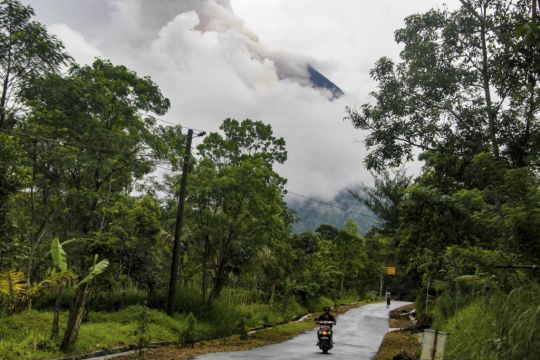Indonesia’s Mount Merapi volcano has spewed out hot clouds in eruptions that forced about 250 residents to flee to temporary shelters and left ash blanketing nearby villages and towns.
The volcano on the densely populated island of Java unleashed clouds of hot ash at least seven times just before and after midnight and fast-moving pyroclastic flows, a mixture of rock, lava and gas, travelled up to 3.1 miles down its slopes, said National Disaster Mitigation Agency spokesperson Abdul Muhari.
The rumbling sound could be heard several miles away.
Mr Muhari said 253 people were evacuated to temporary shelters.

Ash from the eruption blanketed several nearby villages and towns but no casualties were reported, Mr Muhari added.
Residents living on Merapi’s fertile slopes were advised to stay 4.3 miles away from the crater’s mouth and to be aware of the danger posed by lava, Indonesia’s Geology and Volcanology Research Agency said.
Mount Merapi is the most active of more than 120 active volcanoes in Indonesia and has repeatedly erupted with lava and gas clouds recently.
The Volcanology and Geological Hazard Mitigation Centre did not raise Merapi’s alert status, which already was at the second highest of four levels since it began erupting last November.

The 9,737ft peak is near Yogyakarta, an ancient city of several hundred thousand people embedded in a large metro area. The city is also a centre of Javanese culture and a seat of royal dynasties going back centuries.
Merapi’s last major eruption in 2010 killed 347 people and caused the evacuation of 20,000 villagers.
Indonesia, an archipelago of 270 million people, is prone to earthquakes and volcanic activity because it sits along the Ring of Fire, a horseshoe-shaped series of seismic fault lines around the Pacific Ocean.
Its last major eruption was in December, when Mount Semeru, the highest volcano on Java, erupted with fury and left 48 people dead and 36 missing in villages that were buried in layers of mud.
The eruption damaged 5,200 houses and buildings.







